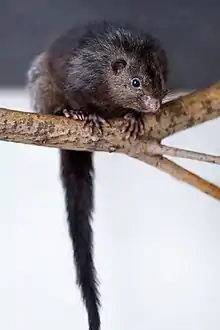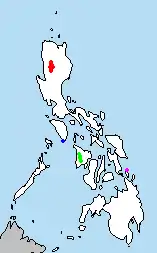| Panay cloudrunner | |
|---|---|
 | |
| Scientific classification | |
| Domain: | Eukaryota |
| Kingdom: | Animalia |
| Phylum: | Chordata |
| Class: | Mammalia |
| Order: | Rodentia |
| Family: | Muridae |
| Genus: | Crateromys |
| Species: | C. heaneyi |
| Binomial name | |
| Crateromys heaneyi Gonzales & Kennedy, 1996 | |
 | |
| Range in green | |
The Panay cloudrunner (Crateromys heaneyi) is the second-largest cloud rat, a squirrel-like rodent that is found on the island of Panay in the Philippines. It is the most endangered rodent species in Panay, and one of the only few known cloud rat species in the world.
Discovery
The Panay cloudrunner was discovered by western science in 1987, and was described as a new species in 1996 by Robert Kennedy of the Cincinnati Museum of Natural History and Pedro Gonzales of the National Museum of the Philippines. The late date of discovery was because the lack of forest cover on Panay which led to the island being largely ignored by biologists.[2]
Description
The Panay cloudrunner is a little over 600 mm long, with grizzled greyish-brown fur and a long, bushy tail making up more than half of the body length. It weighs around 1 kilogram.[3]
Habits
The cloudrunner is nocturnal and arboreal, and nests during the day in the hollow of a large tree. Its diet includes bananas, guavas, corn, papayas, and assorted leaves.[3][4]
Conservation
Continued deforestation on the island of Panay is the major threat to this species, and the animal is now confined to remnant forest in a mountain range on the western end of the island.[3]
References
- ↑ Kennerley, R. (2017). "Crateromys heaneyi". IUCN Red List of Threatened Species. 2017: e.T5502A22415343. doi:10.2305/IUCN.UK.2017-2.RLTS.T5502A22415343.en. Retrieved 19 November 2021.
- ↑ The latest in science and technology news, blogs and articles – Where the Running Rodents Play. Discover Magazine (1997-01-01). Retrieved on 2012-12-28.
- 1 2 3 Panay bushy-tailed cloud rat (Crateromys heaneyi). ARKive. Retrieved on 2012-12-28.
- ↑ Panay Cloudrunner. Encarta
